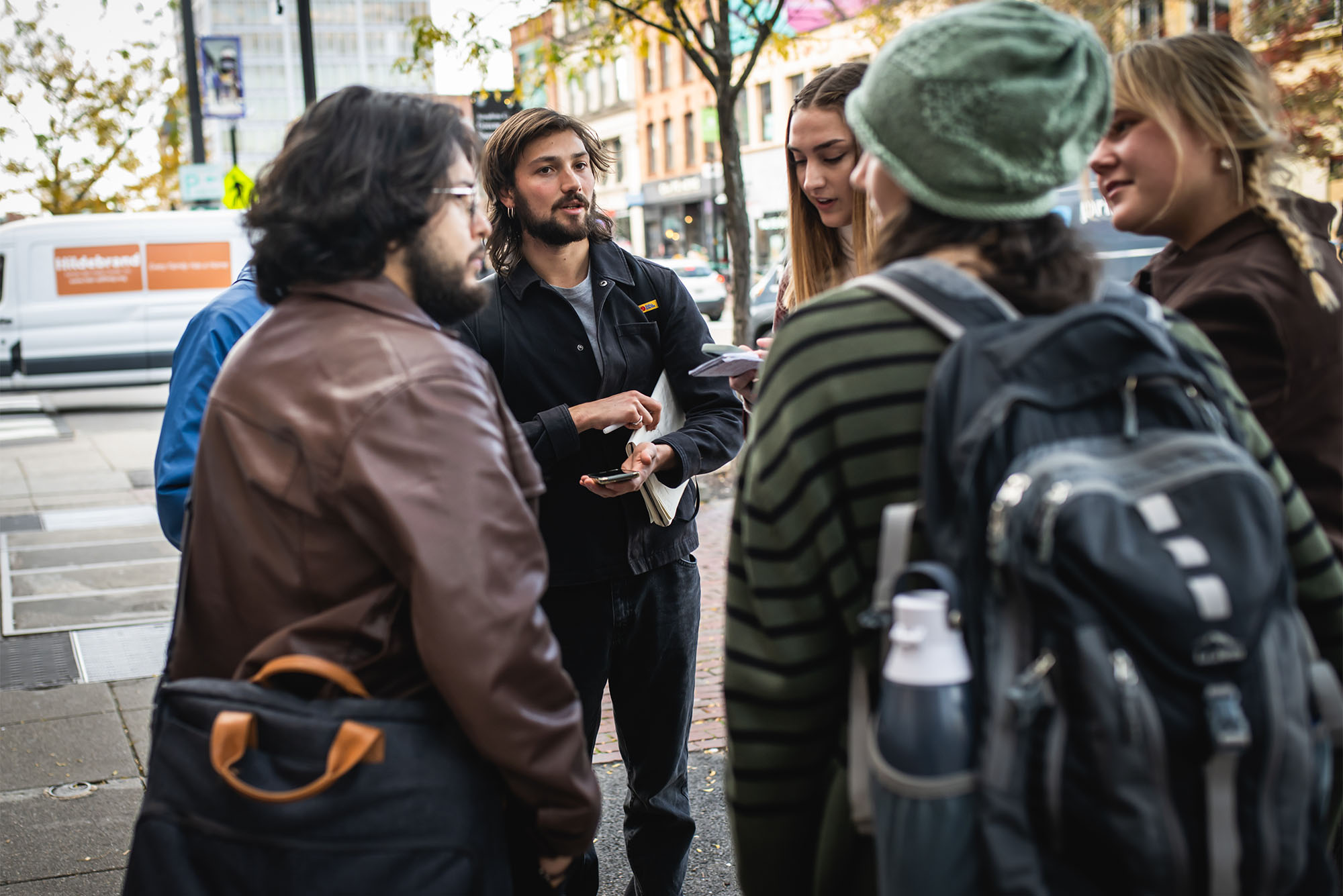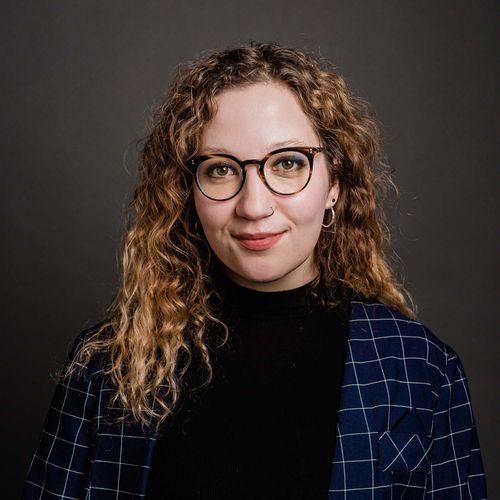New BU MetroBridge Class Studies the Impact of Gentrification

Students in Loretta Lees’ Gentrification Studies course conducting field research in Central Square. “It’s so important for students to get out of the classroom and better understand the relationship between what they study and the ‘real world,’” says Andrew Ward (GRS’29,’29) (center).
New BU MetroBridge Class Studies the Impact of Gentrification
Students teamed up with a local nonprofit to research commercial gentrification in Central Square
When you think about gentrification, you probably think about neighborhoods like Brooklyn, N.Y., or South Boston, where new high-income residents have displaced families who’ve lived there for generations. Gentrification, however, extends beyond housing. It can also result in the displacement of small businesses, an effect known as commercial or retail gentrification.
That was the focus of a project in Loretta Lees’ new Gentrification Studies seminar. Lees, a College of Arts & Sciences professor of sociology and faculty director of BU’s Initiative on Cities, is an internationally recognized expert on gentrification. Her research spans urban planning, housing policy, and social justice, among other topics. Prior to her appointment at Boston University, she taught in the United Kingdom, at the University of Leicester and King’s College London. She also chaired the London Housing Panel, an initiative that recruits community groups for input on housing policy and practice in the city.

Why home in on commercial gentrification? “Housing and businesses are correlated,” Lees says. Here, “the hyper-gentrification that Boston has been experiencing overall, plus the housing crisis off the back of it—that has an impact on small businesses, too,” she says, “and both have to be seen as part of the pressures of a big city.”
Local businesses are also more than just income sources for their owners. Small businesses serve the communities they exist in and play a vital role in shaping the culture and character of a neighborhood. Local businesses, like cafés or family-owned grocery stores, are important “third places,” spaces where people spend time and build relationships outside work and home.
In high-demand cities like Boston and Cambridge, remaining operational as a business is increasingly dependent on the ability to pay exorbitant rents. That means who has staying power isn’t always equitable. Not to mention that whenever a small business closes, it potentially opens the door to a corporate chain that can afford to pay higher rents, running the risk of further homogenizing big cities.
“There’s a lot of evidence across the United States that BIPOC small businesses end up getting displaced more than white businesses,” Lees says. “Studying, and in turn fighting, displacement matters here and in cities all around the world because socially and ethnically mixed cities are not just socially just, they are also good for urban economies, societies, and cultures.”
That’s where her course comes in. The seminar is open to both graduate students and senior undergraduates. It explores gentrification theoretically, conceptually, and practically, including its history, different types—such as commercial gentrification—and related policies. It also examines who and what is to blame and considers resistance and solutions. The course is part of the Initiative on Cities’ MetroBridge program, an experiential learning program that pairs a BU class with a municipality or an organization, with the students conducting a research project related to the class.
MetroBridge paired the Gentrification Studies class with the nonprofit Cambridge Local First (CLF). The Central Square–based organization provides support and promotes its member network of more than 500 independent Cambridge businesses. For its research project, CLF asked the class to investigate and collect data on whether small businesses in Central Square were experiencing commercial gentrification. This semester, the students also got to attend the fall Gentrification: An International Dialogue conference organized by the Initiative on Cities and BU’s sociology.department.


Slides from students’ presentation to partner organization Cambridge Local First, for which the class conducted research on retail gentrification in Central Square. Photos courtesy of Gentrification Studies
MetroBridge courses divide their time between classroom instruction and working on the project. Concepts learned in class often go hand in hand with the project. That’s the most valuable aspect of MetroBridge, says program manager David Gross.
“Our number one goal is to give students real-world learning experiences, because it’s hugely beneficial to both their educational and professional development,” Gross says. “On top of that, we want students to understand that the principles they learn in class really do matter in the real world, and that they can actually make an impact by researching these things.”
In class, the students learned how to collect quantitative and qualitative data related to tracking commercial gentrification. Over the course of the semester, they reviewed Cambridge census data, parsed historical images of Central Square on Google Earth, conducted field interviews with business owners and members of local commerce boards, and collected a head count of businesses from Cole Directories to investigate changes in businesses in Central Square over the past 10 years.
Their findings? Commercial gentrification is underway in Central Square and is driven by a mix of factors. Those include development from the biotech giant Novartis Pharmaceuticals as well as from from MIT and so-called “clean-up” efforts by the local Business Improvement District to move out the square’s homeless population. Increasing rents have also displaced independent businesses in favor of local chains. Students noted an additional boom of bars and restaurants catering to a higher-income population.
Critically, the students found that gentrification in Central Square is at an earlier stage than in adjacent squares in Cambridge and Somerville. So, they determined, if CLF wants to preserve independent businesses and Central Square’s reputation as a diverse arts and cultural hub, now is the time to act—before it’s too late.
Our number one goal is to give students real-world learning experiences…
“We really appreciate all of your time and effort, and I’m really excited to read the write-up,” Pooja Paode, associate director of Cambridge Local First, told the class when they presented their findings. “This speaks to the importance of doing this work across sectors, and I also think it speaks to how beautiful research is.”
Producing research for a working organization was highly impactful, students say.
Andrew Ward (GRS’29,’29), a sociology PhD student studying gentrification and community housing, says taking the course was a no-brainer for him. As a student and community organizer in his native London, Ward says, “I’ve always tried to keep my studies and politics in touch with each other. It’s so important for students to get out of the classroom and better understand the relationship between what they study and the real world.”
Ramona Leung (CAS’24) echoes that opinion: “I often find that sociology courses feel very theoretical and don’t feel like real situations, so being able to have a case study, go there, and talk to business owners and find out what’s happening [in the neighborhood] was really valuable.”
That’s precisely the point of MetroBridge, Gross says.
“The overarching belief at MetroBridge is that cities matter and that we at Boston University are right in the middle of things,” Gross says. Not every student in the program is expected to go into urban planning or policy once they graduate. Rather, Gross says, “we want students to have an understanding of the issues facing cities and to see their importance.”
To put it another way, solving all of the issues facing cities—gentrification, housing shortages and homelessness, encroaching climate change, aging infrastructure—will take all hands. Empowering students to be part of the solutions is a solid start.


Comments & Discussion
Boston University moderates comments to facilitate an informed, substantive, civil conversation. Abusive, profane, self-promotional, misleading, incoherent or off-topic comments will be rejected. Moderators are staffed during regular business hours (EST) and can only accept comments written in English. Statistics or facts must include a citation or a link to the citation.